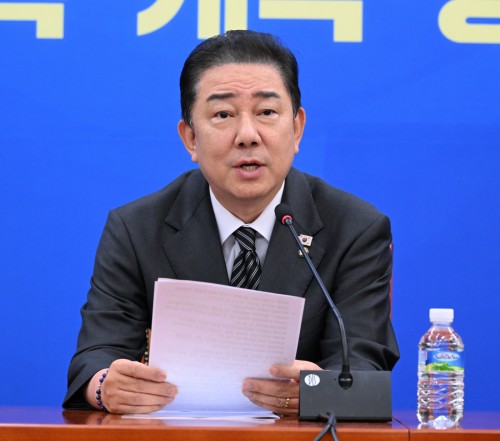 |
| Kim Byung-gi, floor leader of the Democratic Party, presides over a party strategy meeting at the National Assembly in Seoul on September 23. / Source: Song Ui-joo |
The Democratic Party of Korea (DPK) is set to push through sweeping government reorganization bills at a National Assembly plenary session on September 25, including the abolition of the Prosecutors’ Office and a major restructuring of economic ministries. With the ruling party’s overwhelming majority, the opposition People Power Party (PPP) admits it has little power to block the measures and is turning instead to filibusters, street protests, and public opinion campaigns.
The legislation, unilaterally approved in committee by the DPK, would dismantle the Prosecutors’ Office and split its authority. A new Serious Crimes Investigation Agency would be established under the Ministry of the Interior and Safety, while a Prosecution Service would be placed under the Ministry of Justice, effectively severing the prosecution’s powers of investigation and indictment.
The economic overhaul is also extensive. The Ministry of Economy and Finance would be split for the first time in 18 years, with budget functions transferred to the prime minister’s office. The Financial Services Commission would be replaced by a Financial Supervisory Commission, with some functions moved into a new Consumer Protection Bureau. Additional provisions include the creation of a Climate, Environment and Energy Ministry and the replacement of the Korea Communications Commission with a Broadcasting, Media and Telecommunications Commission.
The fast pace of reform has triggered backlash, particularly from within the financial sector, where employees at the Financial Services Commission and the Financial Supervisory Service oppose the dismantling and redistribution of their agencies. Even among ruling party lawmakers, calls have surfaced for a phased reorganization. Though the reforms are slated to take effect January 2, 2026, some insiders caution implementation could slip until April.
Facing this, the PPP has few viable options. While it is weighing unlimited filibusters to delay passage, the strategy is limited given the DPK’s supermajority of 180 seats. Party leaders acknowledge their efforts may not block votes but argue the tactic will spotlight what they call “railroading” by the ruling camp.
At a press briefing marking his 100th day as floor leader, Song Eon-seok of the PPP said, “In a situation where the ruling party refuses to listen, many within our party see filibusters on all bills as the only option available to us as a minority opposition.”
PPP lawmaker Bae Jun-young echoed this stance in a radio interview: “We will expose each forced bill through filibusters before the people, and later seek to hold the ruling party legally accountable. As the opposition, our only path is to appeal directly to citizens.”
Most Read
-
1
-
2
-
3
-
4
-
5
-
6
-
7





















